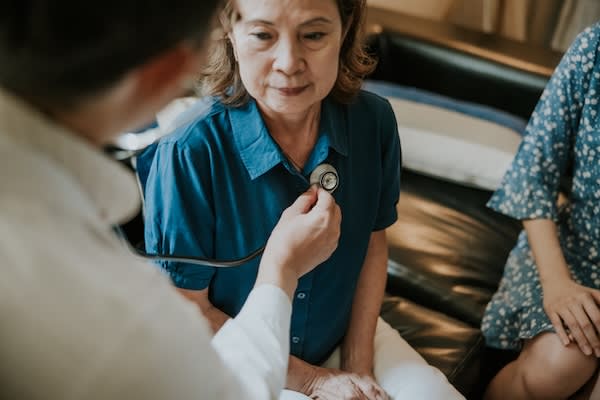
[3 MIN READ]
In this article:
-
Most lung cancer deaths are still linked to smoking — but diagnoses in non-smokers are on the rise.
-
In non-smokers, lung cancer may be driven by genetic factors and mutations that build up over time.
-
Early detection improves survival. Even without screening guidelines for non-smokers, there are steps you can take to lower your risk.
There’s reason for hope when it comes to lung cancer. Thanks to lower smoking rates, better screening, and improved treatments, lung cancer diagnoses are declining. And while it remains the leading cause of cancer deaths in the U.S., more people are surviving and living longer.
But here’s what’s surprising: even though about 80% of lung cancer deaths are linked to cigarette smoking, more non-smokers are being diagnosed than ever before. Understanding your risk—whether or not you smoke—can help you catch the disease early or even prevent it altogether.
What causes lung cancer?
Researchers have found that most lung cancer tumors are caused by the accumulation of mutations – particularly in DNA repair genes. When environmental triggers like tobacco smoke, pollutants or other small particles get into the lungs, they can cause irritation that leads to mutations in healthy cells.
But mutations alone might not lead to cancer. Though there’s not been a single gene or biomarker identified, some oncology experts believe many lung cancer patients, especially non-smokers, may have a genetic predisposition that enhances the rate of mutations that lead to cancer.
“We don’t have one overarching explanation,” says Sid Devarakonda, M.D., director of thoracic medical oncology at the Providence Swedish Cancer Institute. “But it’s possible that a certain percentage of the diagnosed never-smoker population has a genetic predisposition.”
Early symptoms of lung cancer in non-smokers
Symptoms of lung cancer may be subtle and hard to detect, especially in the early stages. Some of the most common signs include:
- Persistent cough
- Chest pain or discomfort
- Hoarseness
- Fatigue
- Unexplained weight loss
- Shortness of breath
Risk factors for lung cancer beyond smoking
Smoking has historically been a leading cause of most lung cancer diagnoses, but secondhand smoke, pollution and exposure to other carcinogens can also lead to lung cancer – including among non-smokers.
Other risk factors for lung cancer among non-smokers include:
- Family history of lung cancer
- Increased age
- Radiation, radon gas, asbestos and other carcinogen exposure
- Secondhand smoke exposure
While lung cancer has traditionally impacted slightly more men than women, researchers have found that women diagnosed with lung cancer were far more likely to have never smoked than men diagnosed with lung cancer. This disparity was particularly high for Asian women.
Reducing your lung cancer risk
While lung cancer screening is recommended for many current and former smokers, the guidance is less clear for non-smokers. Lung cancer screening aims to catch cancer in an early stage before it spreads, which is often before any symptoms develop and when treatment can be most effective. Even if you are a non-smoker, speak with your physician if you have risk factors for lung cancer to determine if screening is right for you.
When it comes to cancer prevention, you can lower your risk of developing lung cancer by:
- Avoiding secondhand smoke, air pollution and other carcinogens
- Eating healthy foods, including a diet rich in fruits and vegetables
- Maintaining an active lifestyle
- Testing your home for radon, a naturally occurring, odorless gas
“Smoking is the most important and preventable cause of lung cancer,” says Dr. Devarakonda. “Anything that can cause inflammation through inhalation, or increase the risk of mutations in lung cells, in theory, could contribute to an increased risk of cancer.”
When to see a doctor
If you experience persistent coughing, unexplained fatigue, or any of the symptoms mentioned above—especially if you have a family history of lung cancer—talk to your doctor. Early detection is key to successful treatment.
Providence offers same-day and urgent care appointments for your convenience.
Other common questions about lung cancer and non-smokers
Can a healthy non-smoker get lung cancer?
Yes. Even healthy individuals can develop lung cancer due to environmental or genetic factors.
What are signs of lung cancer in non-smokers?
Persistent cough, chest pain, fatigue, hoarseness, and unexplained weight loss.
How common is lung cancer in people who don't smoke?
About 10-20% of all lung cancer cases in the U.S. occur in non-smokers.
Contributing Caregiver
Sid Devarakonda, M.D., director of thoracic medical oncology at the Providence Swedish Cancer Institute First Hill.
Find a doctor
Your provider can connect you to care and treatments that can improve your quality of life. If you are looking for a primary care provider, you can search for one who’s right for you in our provider directory.
Download the Providence app
It’s all in the app: easily stay connected with Providence and your health. With the Providence app, you can schedule appointments, have virtual visits from the comfort of your home, get personalized health recommendations, access your health records and so much more. Learn more and download the app.
Related resources
E-cigarettes (vaping) can be dangerous for your health
Celebrating and supporting cancer survivors
Breathe in, breathe out: Recognizing risk factors for lung cancer
This information is not intended as a substitute for professional medical care. Always follow your health care professional’s instructions.
About the Author
More Content by Providence Cancer Team





















